How to Build Your B2B Lead Database
Casey O'Connor
A B2B lead database is a detailed and organized list of information about potential buyers that sales and marketing use for outreach purposes.
The B2B lead database is one of the most important resources in the sales process. An incomplete, out-of-date, or otherwise subpar database will cost your marketing and sales teams time, money, and energy; both teams need to align carefully to build and maintain it.
In this article, we’ll go over everything you need to know about the B2B lead database, including what it includes, why it’s so important to your business, and how to build and maintain an effective one.
Here’s what we’ll cover:
- What Is a B2B Lead Database?
- The Importance of B2B Lead Databases
- Building Your B2B Lead Database
- Data Enrichment
- Maintaining Your B2B Lead Database
- Yesware Can Help Enable Your Sales Teams
What Is a B2B Lead Database?
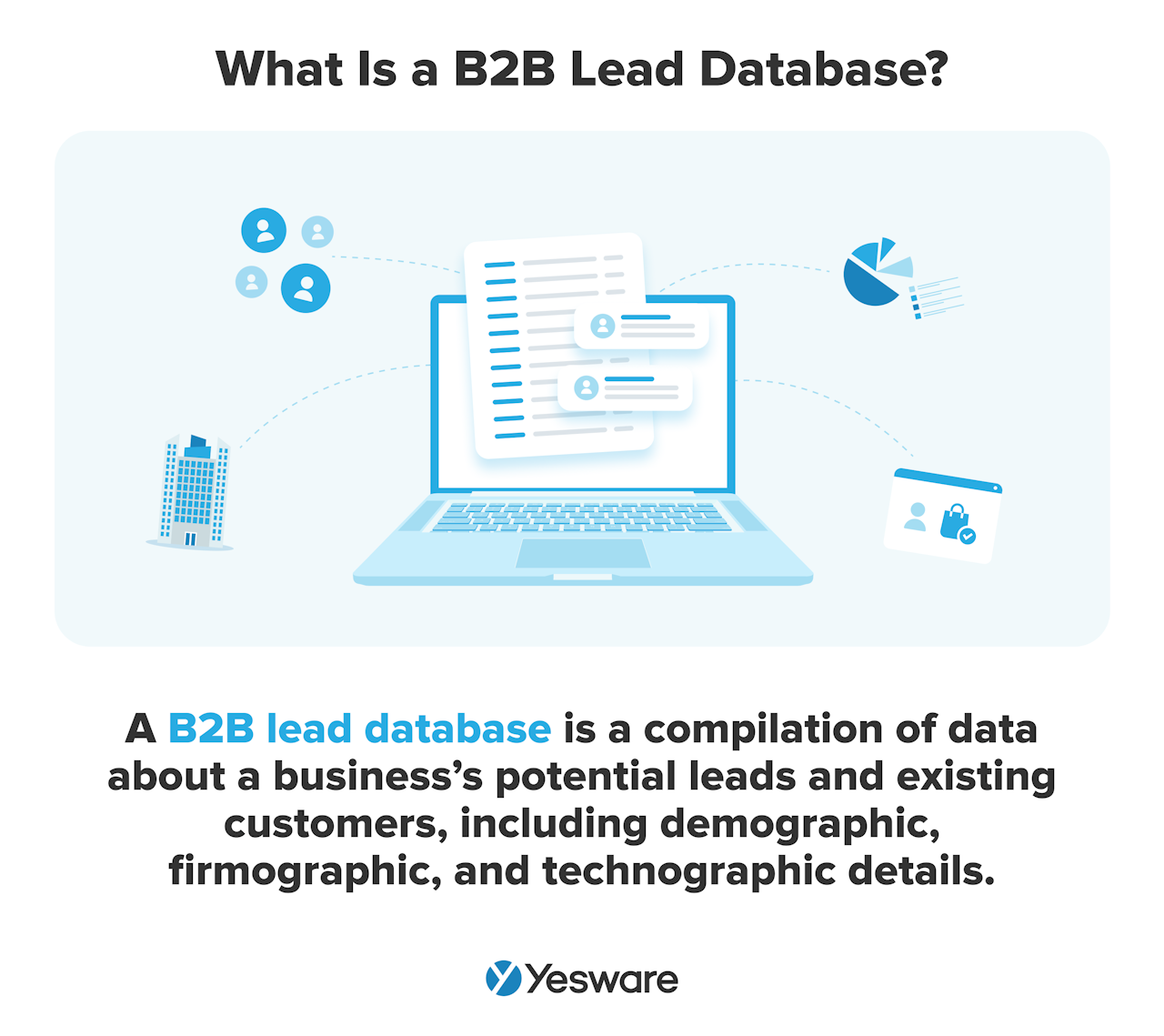
A B2B lead database is a compilation of data about a business’s potential leads and existing customers, including demographic, firmographic, and technographic details.
Data points in a B2B lead database might include (but are not limited to):
- Business name
- Business address
- Business phone number
- Industry
- Size
- Performance metrics
- Names and roles of important contacts/decision-makers
- Important personal or professional details
- Notes about recent contact or engagement
B2B sales and marketing teams use these databases to help them navigate lead outreach and manage the many moving parts of a dynamic sales funnel.
Although most sales teams are well aware that they need a B2B lead database, many are undereducated about just how important they are (and how complex they can be).
The Importance of B2B Lead Databases
In today’s B2B sales world, leads are like gold.
In fact, most B2B marketers agree that lead quality is the most important factor in determining business success.
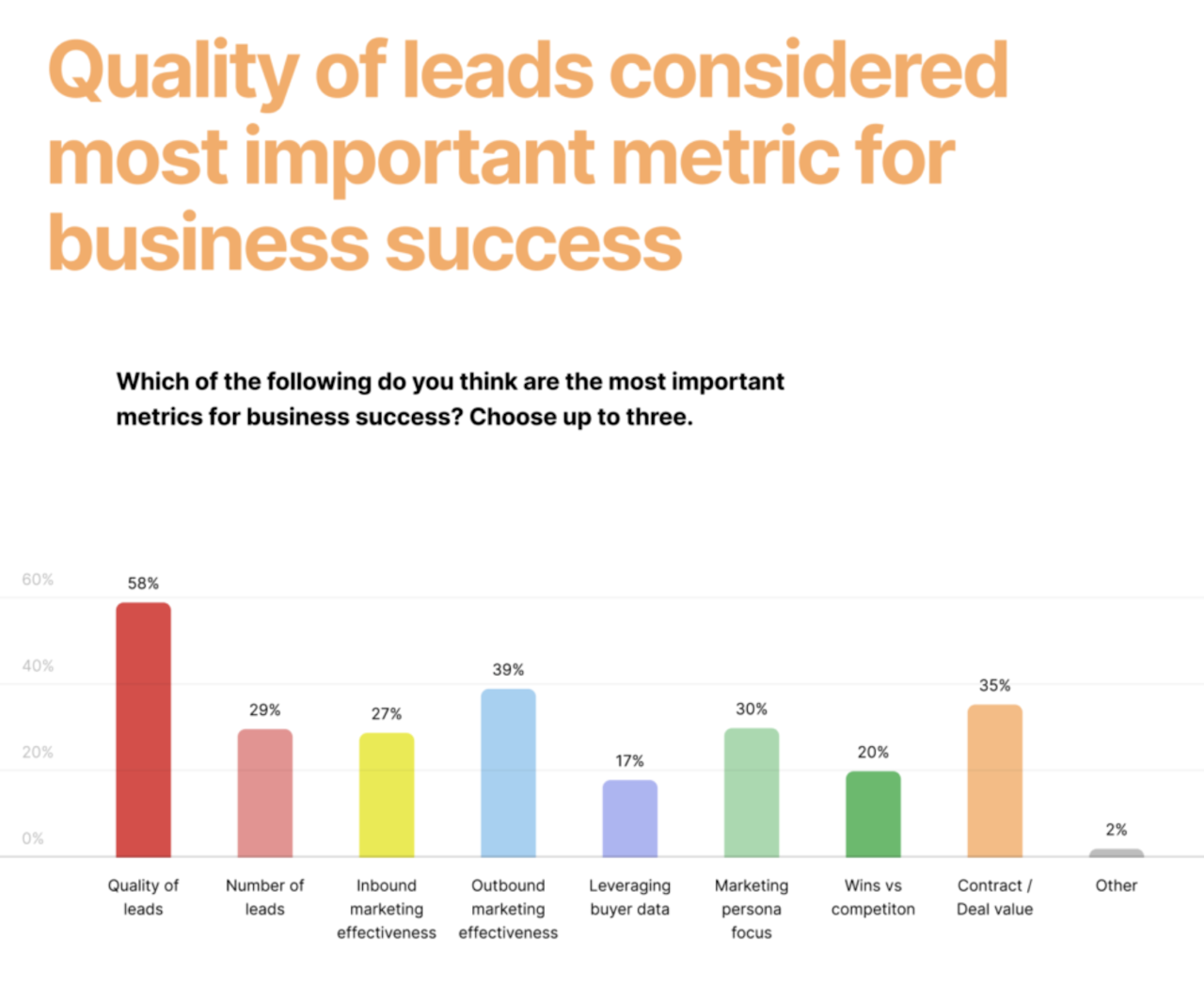
The more you know about your leads, the better and more easily you can qualify them. A B2B lead database helps streamline and optimize the process of learning more about leads to identify the best quality prospects. This means sales reps spend less time selling to low-quality leads and more time closing high-value deals.
A lead database also allows sales reps to quickly and easily connect with prospects, giving them access to accurate, personalized data at their fingertips.
And these timely insights can make all the difference; most B2B buyers have come to expect personalization and will abandon brands who don’t make the effort.

A B2B lead database helps sellers keep all of their leads’ contact information organized and maintained in a way that helps them connect personally and productively with buyers.
A database with lead information is also helpful for record-keeping purposes and performance tracking. It can help teams recognize patterns and trends over time, which can assist with sales forecasting and overall sales strategy.
Building Your B2B Lead Database
There are many different ways to approach building your B2B lead database.
Some companies choose to source their own data and use that to build internal spreadsheets and CSVs. Others opt to use B2B lead database platforms that do much of the research work on behalf of sales teams.
We’ll look more carefully at these different approaches later in this section.
Ideal Customer Profile
Regardless of how sales and marketing collect and source their data, they first need to align to develop an ideal customer profile (ICP). 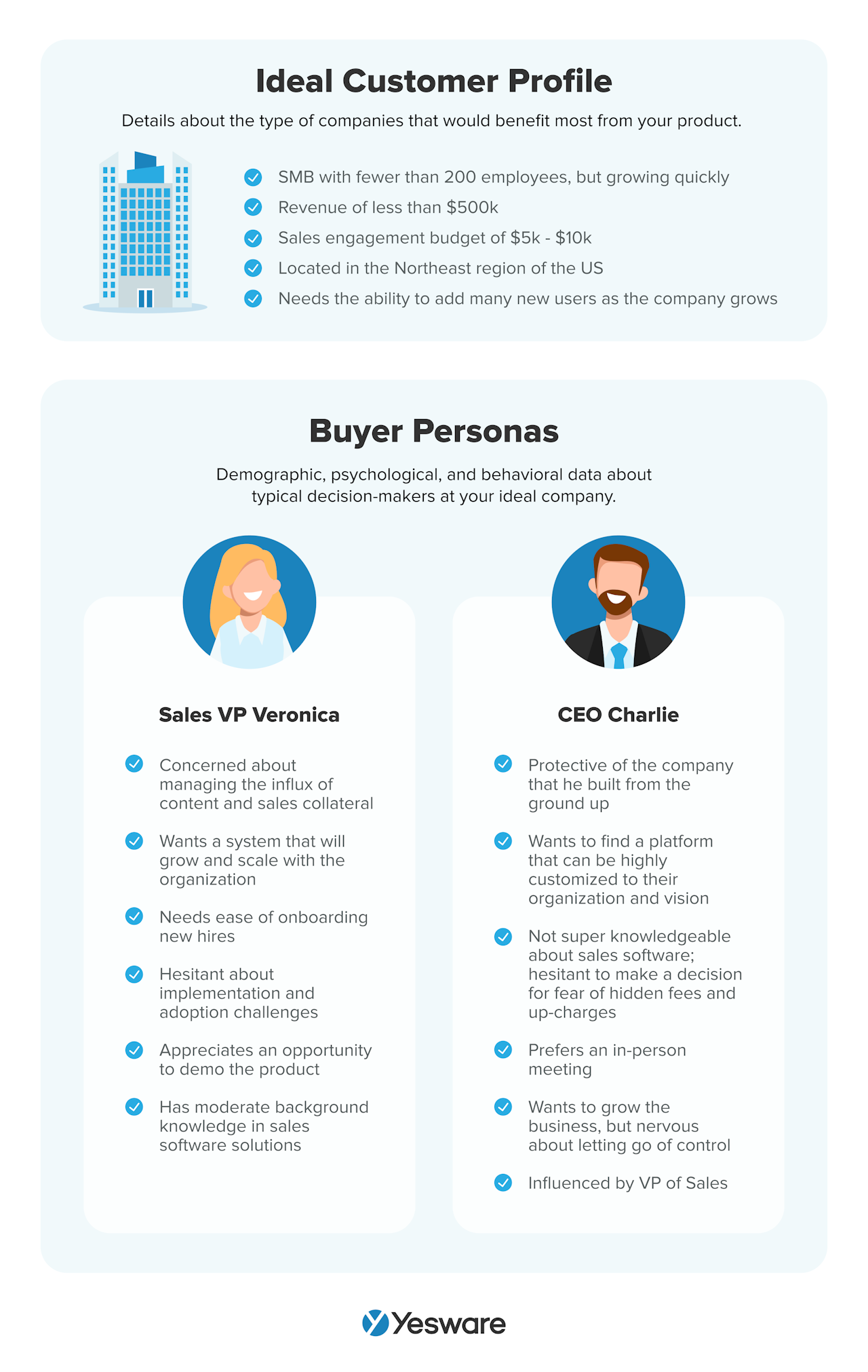 These details will help sales teams leverage their B2B lead database to identify best-fit contacts so they can prioritize those leads and disqualify those who do not match the qualifications of the ICP.
These details will help sales teams leverage their B2B lead database to identify best-fit contacts so they can prioritize those leads and disqualify those who do not match the qualifications of the ICP.
Data Collection and Sourcing
There are generally two main ways that sales and marketing teams build their B2B lead databases: first-party research and manually-created spreadsheets or a B2B lead database software platform.
The method you choose will ultimately depend on what type and volume of data you need to source, as well as the price you can afford to pay to do so.
For context, B2B lead databases may contain any combination of the following data, plus anything else relevant for sales reps to know as they navigate prospecting:
- Name
- Job title
- Phone number
- Email address
- Mailing address
- Demographic information (gender, location, salary, etc.)
- Psychographic information (values, spending habits, hobbies, tendencies, etc.)
Sales reps and marketers can collaborate to source and collect this information themselves. Some teams prefer this method because it gives them more control over how and from where they collect their data. It’s also more affordable.
On the other hand, manual data collection is a time-consuming and tedious task and can be prone to errors and incompleteness.
For those reasons, many teams adopt a B2B lead database platform that helps them source and collect large volumes of lead data.
Platforms like these do the heavy work for sales and marketing teams and give them access to the data they need directly at their fingertips as they work through their outreach process.
Some organizations also choose to buy leads (which is a separate process from purchasing and implementing a lead database platform). One advantage of this strategy is that these lead lists are often uniquely curated for each individual organization; and, depending on the manpower required to build a lead list from scratch, may turn out to be cheaper in the long run.
Compliance
No matter which method your team uses to source and collect data, everyone needs to be extremely knowledgeable of and adhere to all of the most up-to-date privacy compliance laws and regulations.
Protecting buyers’ data is of utmost importance, and everyone who has access to it should take responsibility for understanding the rules.
That also means doing your due diligence if and when you search for a B2B lead database platform.
Each state’s laws are unique, so be sure to thoroughly research all areas (or consult a legal expert) before you standardize your data collection practices.
Remember — ultimately, the way you build your B2B lead database will be determined by the unique needs of and resources available to your team. The important part is less about how you build it and more about the fact that you build one at all.
According to one large IBM study, poor-quality lead data costs companies over $3 trillion each year, so your team should choose whatever process will help ensure that your data is accurate, thorough, and relevant.
Data Enrichment
Data enrichment is the process of sourcing and extracting lead data to enhance the existing information and make lead profiles more complete. This helps sales reps target prospects more effectively. 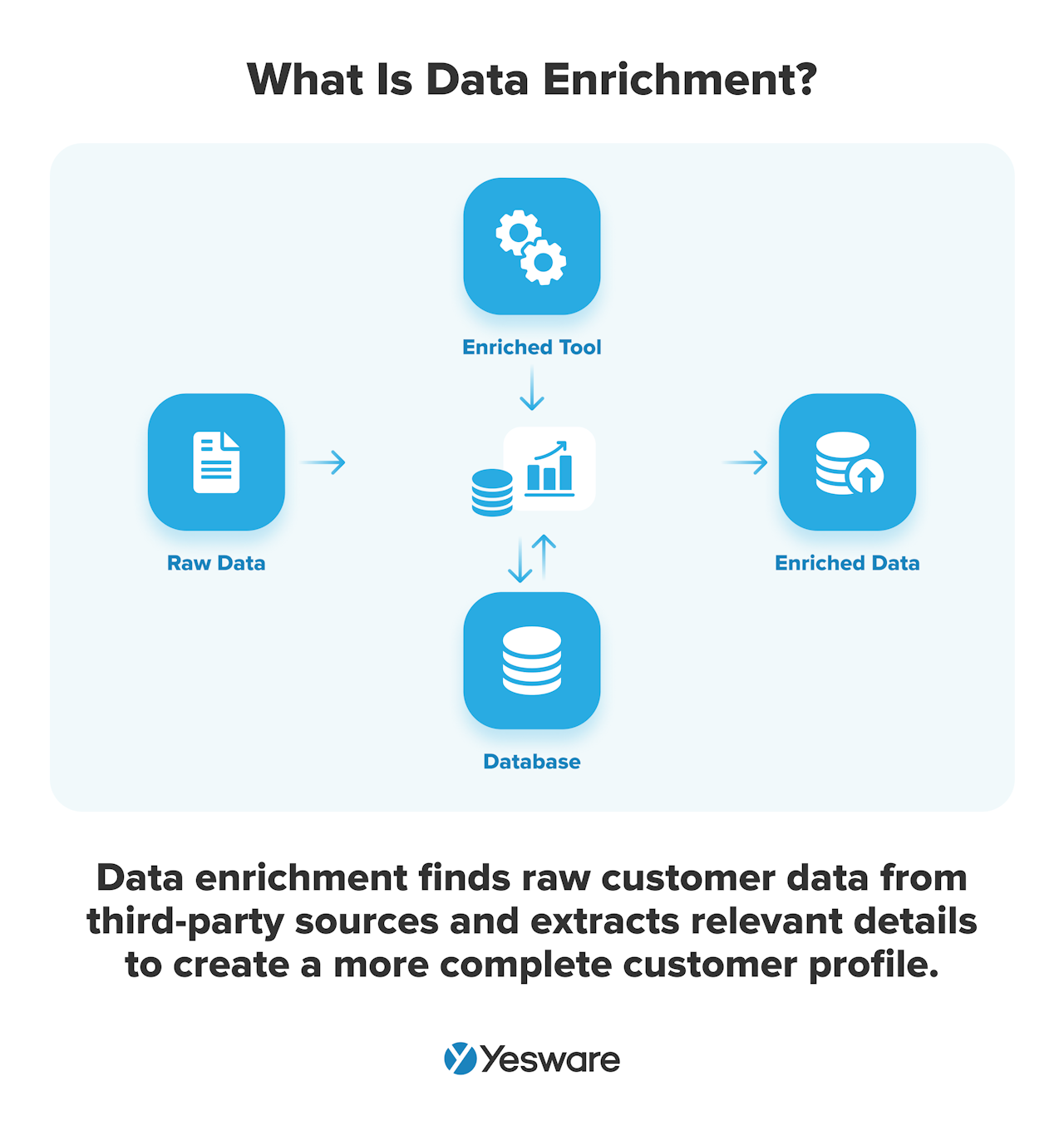 The more complete the profiles are in your B2B lead database, the more personalization and value your team can add to each interaction.
The more complete the profiles are in your B2B lead database, the more personalization and value your team can add to each interaction.
Tip: Yesware’s Contact Enrichment feature gives you the ability to auto-create an enriched profile for each desired contact, all within your inbox.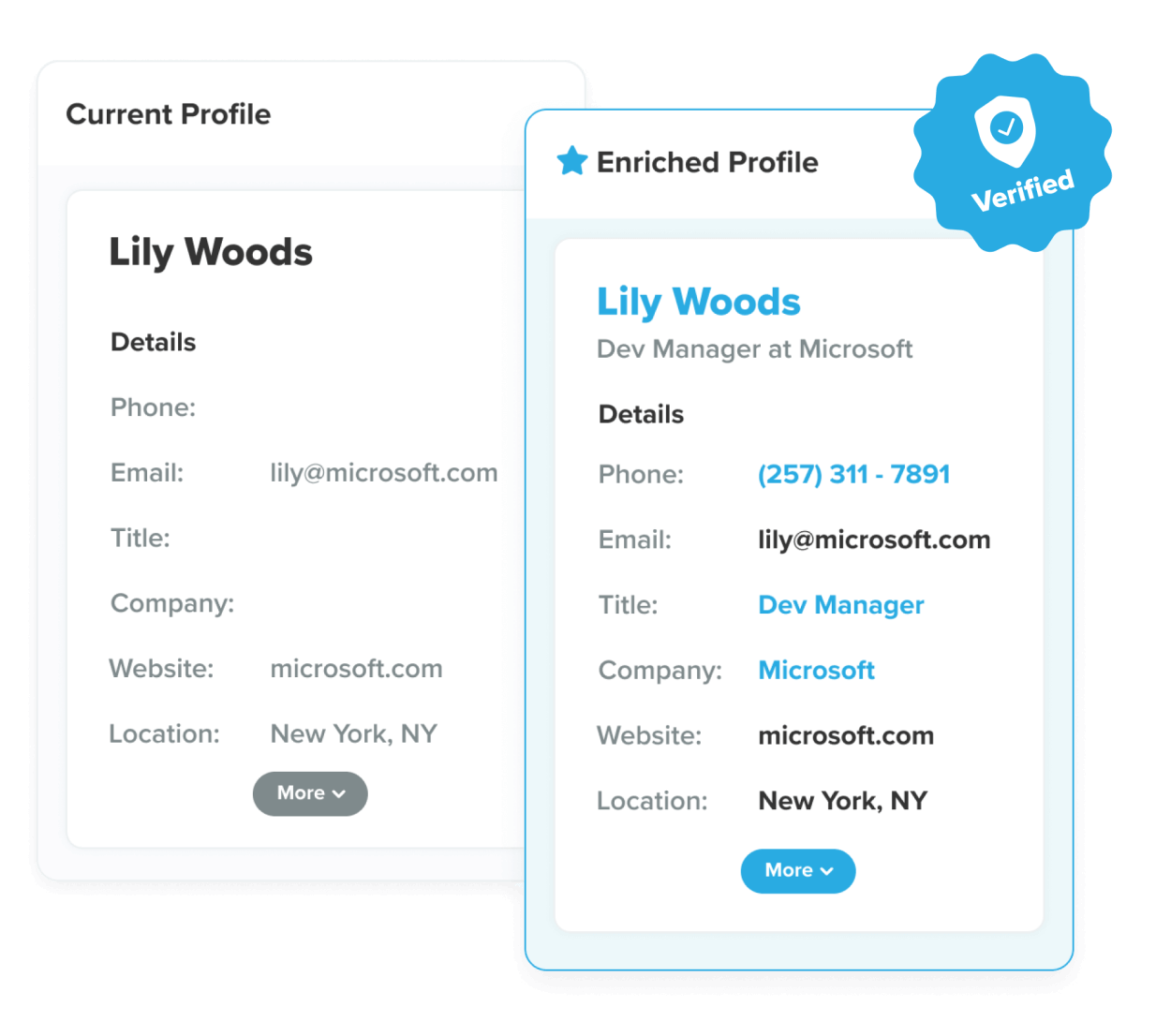 With Yesware, you never have to think about database decay, and you can rest assured with full GDPR and CCPA compliance.
With Yesware, you never have to think about database decay, and you can rest assured with full GDPR and CCPA compliance.
Maintaining Your B2B Lead Database
Careful maintenance of your B2B lead database is just as important as the steps you take to build it. Here are some considerations to take into account as you make a plan for maintaining your team’s database.
Importance of Clean Data
It’s worth noting that, in all this talk about data, what we’re actually referring to is “clean data” — that is, data that’s accurate and up-to-date. For many companies, clean data also means information that’s collected from legitimate sources, formatted correctly, stored in the proper place, and verified for completion.
Clean data improves sales productivity by eliminating the time they would need to take to filter through bad data and/or research additional data to supplement an incomplete or out-of-date profile.
It also helps sales reps make more sound and data-driven decisions throughout the sale process.
Strategies for Data Cleansing
The kinds of data cleansing strategies your team will need will depend on how and when you collect and store data. It’s up to your team to decide how to best prevent inaccurate or corrupt data.
Here is a general framework to get you started. You may find that your team needs additional strategies (or fewer if you’re just getting off the ground), but the following 10 strategies are a solid start.
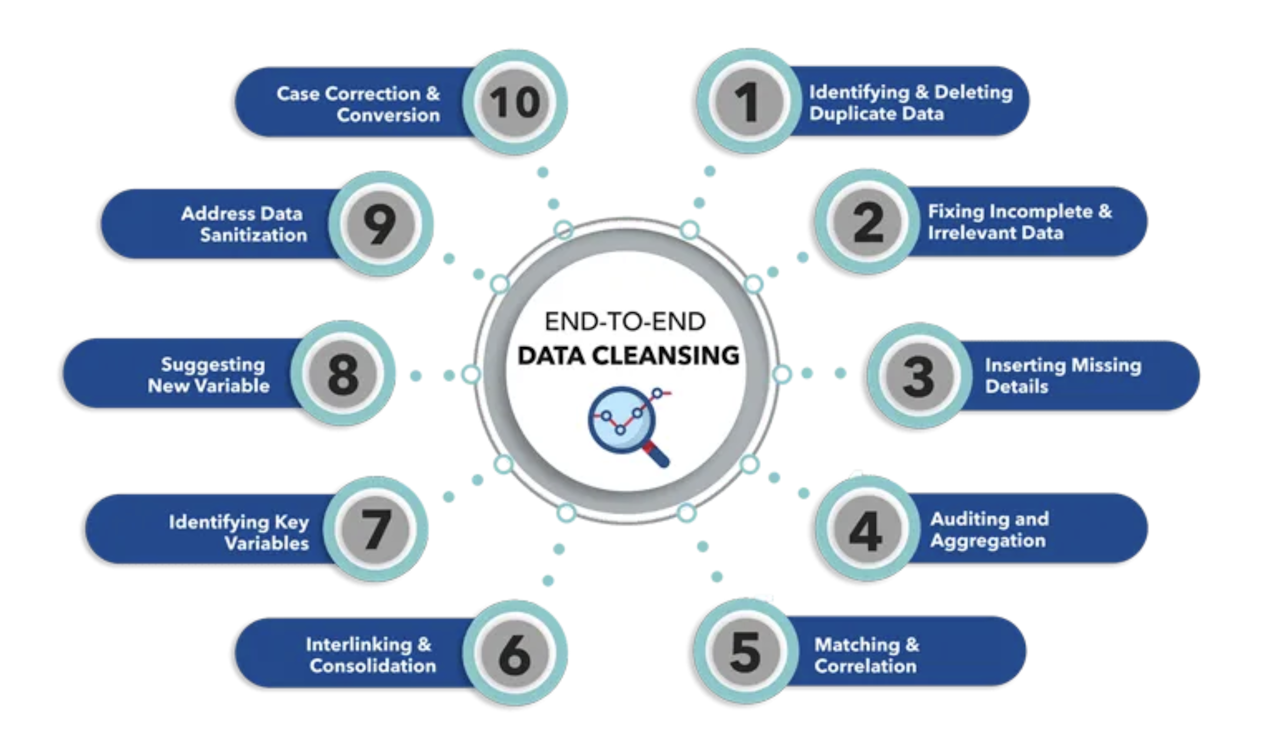
Data cleansing can be a time-consuming process, so the more you can standardize and create a repeatable cycle around it, the more efficient your team will be.
Preventing Data Decay
Data decay can refer to many different things, but for the purposes of this article, it’s an umbrella term for all kinds of bad data.
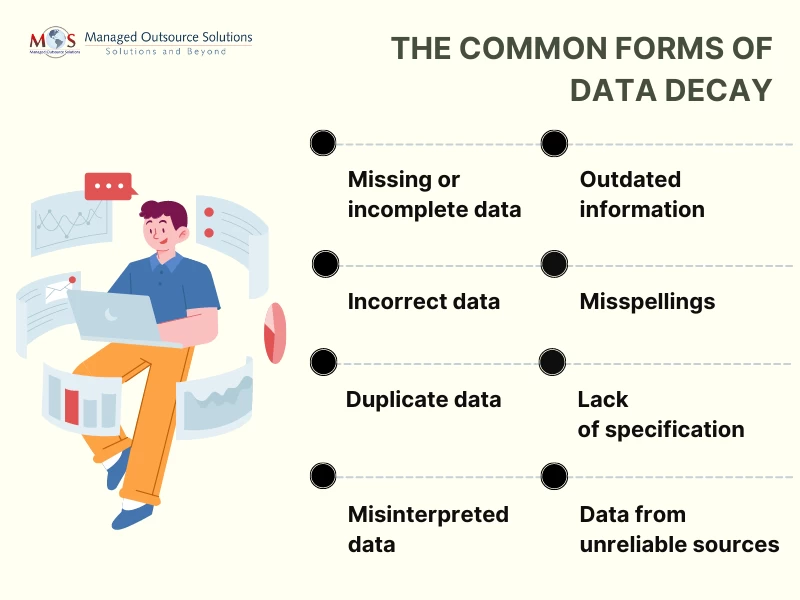
To prevent data decay, it’s important to engage with your target audience on a regular basis with meaningful content.
It’s also okay (in many cases) to ask customers directly to verify or update their information.
A clear and standardized data hygiene strategy will also help prevent data decay.
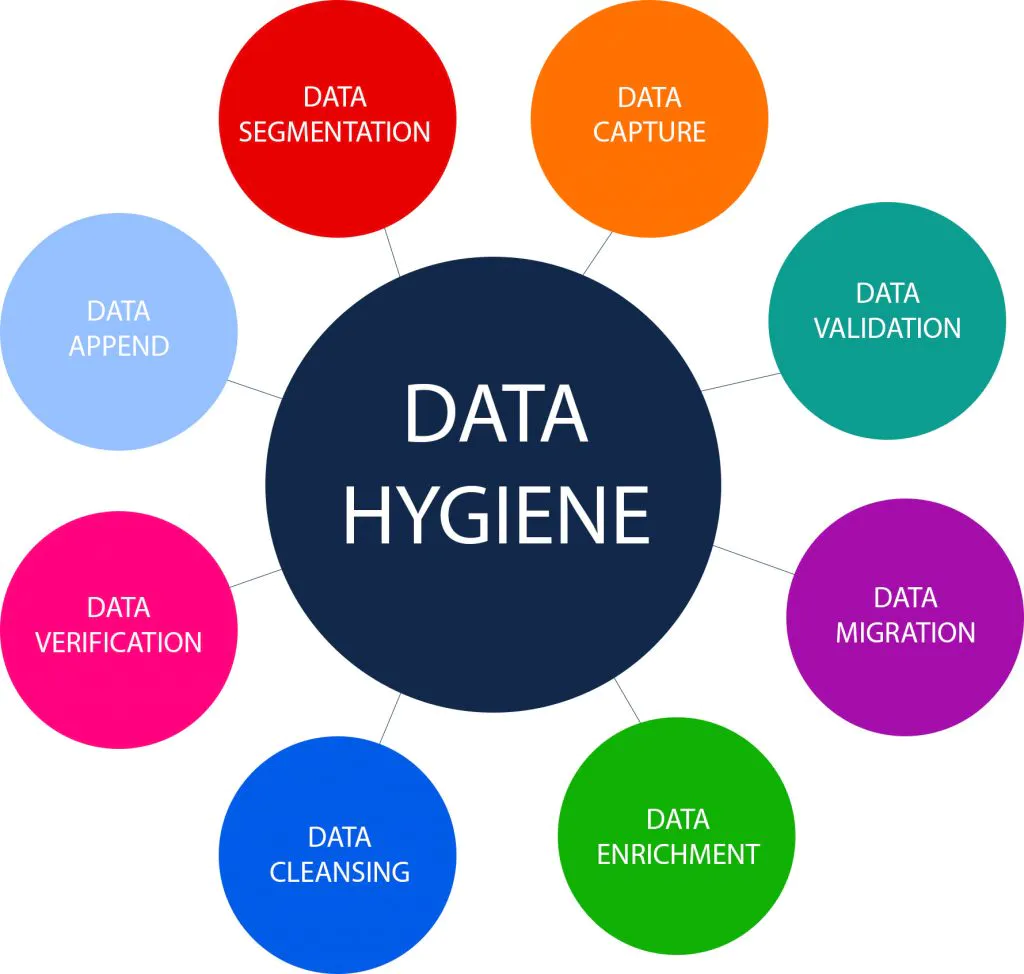
Perhaps one of the most important steps in preventing data decay is making sure that everyone involved in collecting, storing, managing, and/or using data is aligned in each of the many processes and minute details involved.
Data Verification
Data verification is the process of ensuring the data is accurate and consistent. It’s important that databases take this step to ensure quality.
There’s nothing more important than trustworthy data. That’s why Yesware has a multi-step verification process with cross-checks across multiple surfaces.
Data verification typically takes place when the data is migrated or merged.
Data Storage
As (if not more) important as your data collection is your data storage.
With access to buyer data easier than ever before, sales teams need to be extremely proactive in keeping up with the latest governance practices around data protection. The General Data Protection Regulation (GDPR) provides strict storage guidelines that are a good starting point for sales and marketing teams, but it’s important to do your due diligence even beyond that to ensure you’re adhering to any state- or local-specific regulations.
Maintaining your B2B lead database is an ongoing, continuous process. It’s important that everyone on the team is well-versed in the steps of the process and that there’s accountability for everyone to play their part.
In light of this, regularly check and optimize your data storage practices and integrate them into the team’s routine to uphold security measures and drive operational excellence.
Tip: Growing your B2B sales team? Grab our free ebook below.
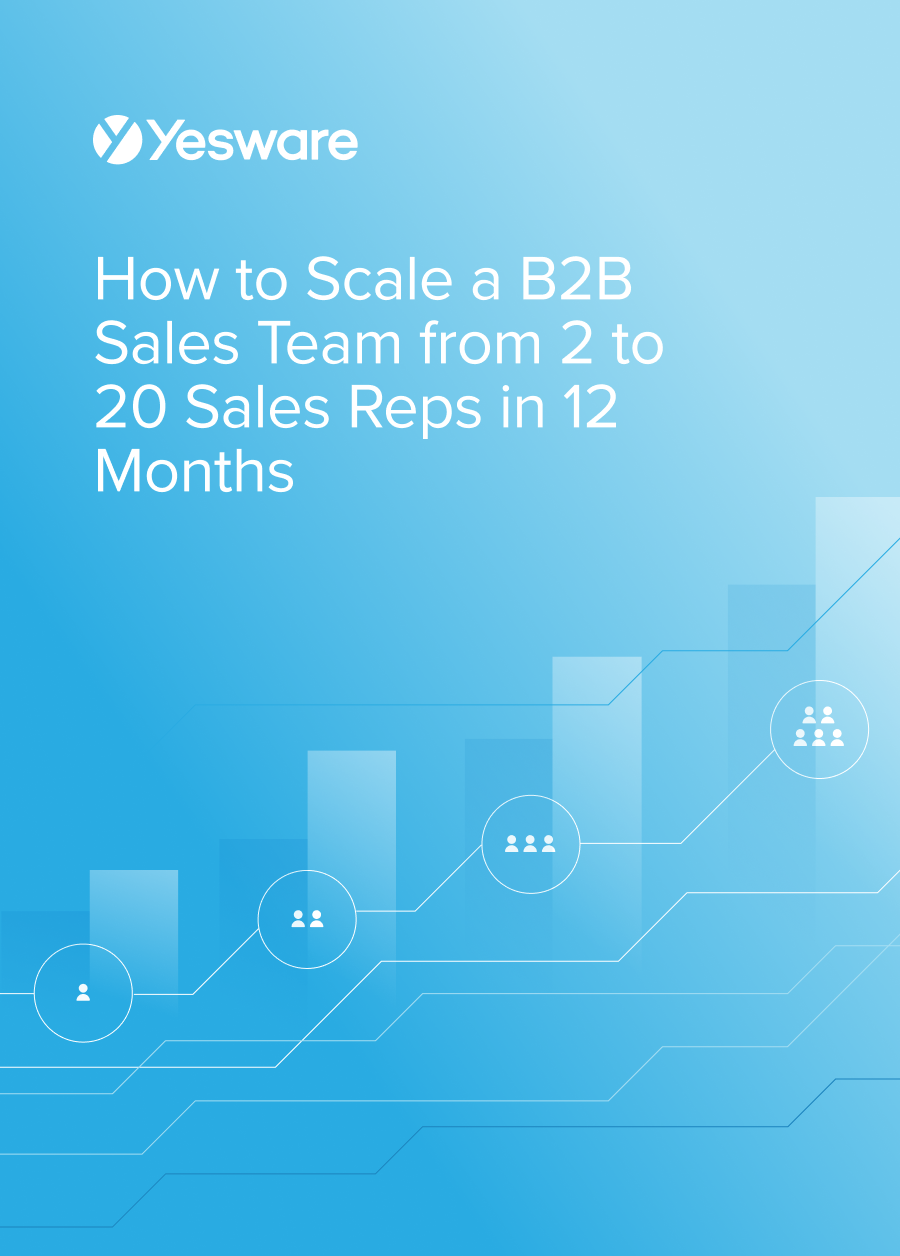 How to Scale a B2B Sales Team from 2 to 20 Sales Reps in 12 MonthsA step-by-step blueprint and action plan for growing a sales team in a way that maximizes profitability.
How to Scale a B2B Sales Team from 2 to 20 Sales Reps in 12 MonthsA step-by-step blueprint and action plan for growing a sales team in a way that maximizes profitability.
Yesware Can Help Enable Your Sales Teams
Yesware’s Prospector tool has access to over 100 million business profiles, with Gmail and Outlook integration (and instant data access) in less than one minute.
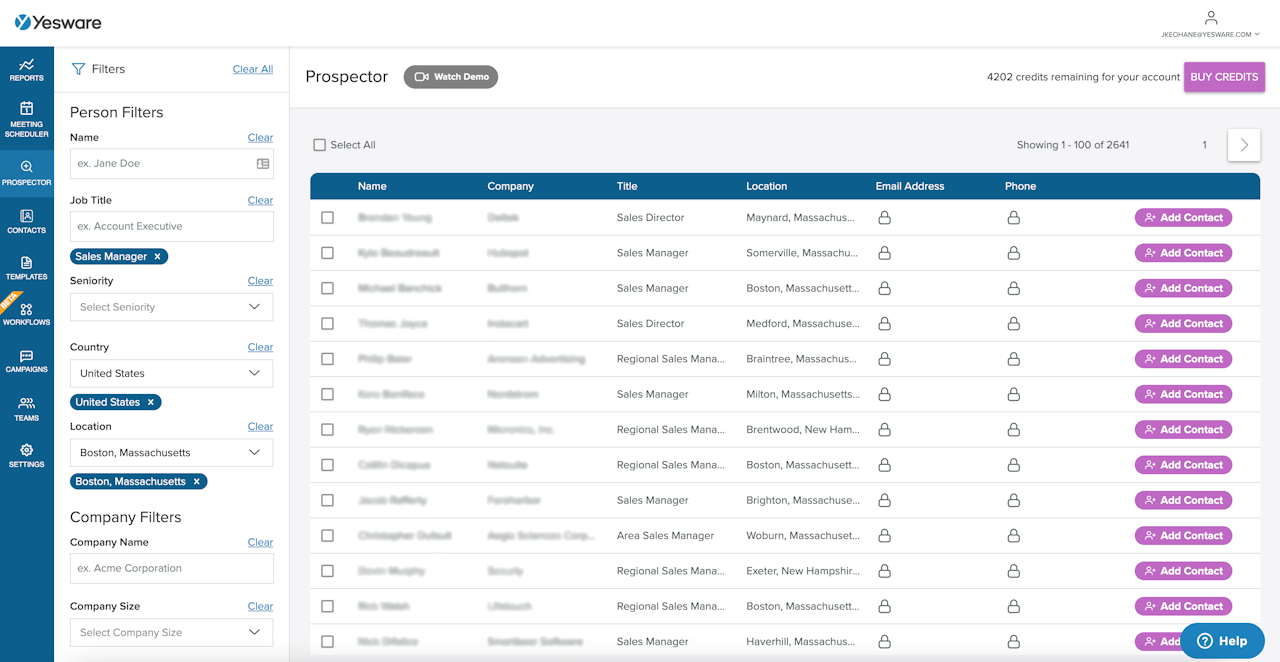
All data is verified on a regular basis and auto-uploaded/updated, eliminating hours of weekly and monthly manual work for sales reps and marketers.
And our advanced search filters save even more time, allowing reps to search for specific data to make outreach fast and easy.
Do you have a B2B lead database? How functional is it? What next steps can you take to make it more streamlined and valuable for your team?
Get sales tips and strategies delivered straight to your inbox.
Yesware will help you generate more sales right from your inbox. Try our Outlook add-on or Gmail Chrome extension for free, forever!
Related Articles
Casey O'Connor
Casey O'Connor
Casey O'Connor
Sales, deal management, and communication tips for your inbox

